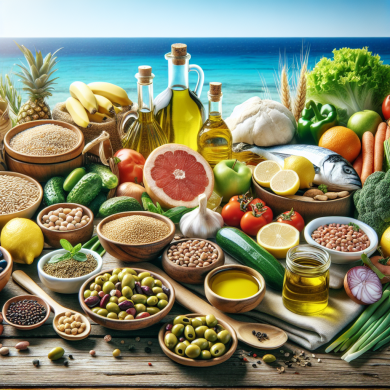Top Fish Choices for a Mediterranean Diet
Introduction to the Mediterranean Diet
The Mediterranean Diet is renowned for its health benefits and is often considered one of the healthiest eating patterns worldwide. This diet mimics the traditional dietary habits of people living in countries bordering the Mediterranean Sea, such as Greece, Italy, and Spain. It emphasizes the consumption of plant-based foods, whole grains, legumes, nuts, seeds, and healthy fats, primarily from olive oil. A crucial component of this diet is the inclusion of seafood, particularly fish, which is a rich source of high-quality protein and omega-3 fatty acids.
The Role of Fish in the Mediterranean Diet
Fish is a cornerstone of the Mediterranean Diet, providing essential nutrients that contribute to heart health, brain function, and overall well-being. It is recommended to consume fish at least twice a week as part of this dietary pattern. Fish is low in saturated fat and high in important nutrients such as vitamin D, vitamin B2 (riboflavin), calcium, phosphorus, iron, zinc, iodine, magnesium, and potassium. The omega-3 fatty acids found in fish are known to reduce inflammation and are beneficial for heart health.
Top Fish Choices for a Mediterranean Diet
When selecting fish for a Mediterranean Diet, it’s essential to focus on varieties that are rich in omega-3 fatty acids, sustainable, and low in mercury. Here are some of the top fish choices:
Salmon
Salmon is one of the most popular and nutritious fish choices. It is incredibly rich in omega-3 fatty acids, which are known for their anti-inflammatory properties and cardiovascular benefits. Salmon is also a great source of high-quality protein, vitamins, and minerals. Wild-caught Alaskan salmon is often recommended due to its lower mercury content and sustainable fishing practices.
Sardines
Sardines are small, oily fish that are packed with nutrients. They are an excellent source of omega-3 fatty acids, vitamin D, calcium, and vitamin B12. Sardines are often consumed canned, making them a convenient and affordable choice. They are also sustainable and have a low mercury content.
Mackerel
Mackerel is another oily fish rich in omega-3 fatty acids. It is a good source of vitamin D, selenium, and vitamin B12. Mackerel has a strong flavor and is often grilled or smoked. Like sardines, mackerel is a sustainable choice and is low in mercury.
Anchovies
Anchovies are small, flavorful fish that are often used as a seasoning or topping. They are high in omega-3 fatty acids and provide a good source of protein, calcium, and iron. Anchovies are usually cured in salt, so it’s important to consume them in moderation due to their sodium content. They are considered sustainable and have a low mercury level.
Trout
Trout, particularly rainbow trout, is a freshwater fish that is rich in omega-3 fatty acids. It is an excellent source of protein, B vitamins, and essential minerals like phosphorus and selenium. Farmed rainbow trout is often recommended as a sustainable option with a low environmental impact.
Tuna
Tuna is a popular fish choice for its versatility and nutritional content. It is a good source of omega-3 fatty acids, vitamin D, and protein. However, some species of tuna can be high in mercury, so it’s important to choose varieties like skipjack or canned light tuna, which have lower mercury levels. Consumption should be moderated to avoid excessive mercury intake.
Sea Bass
Sea bass is a mild-flavored fish that is often enjoyed in Mediterranean cuisine. It is a good source of protein, omega-3 fatty acids, and essential nutrients like selenium and magnesium. Sea bass can be grilled, baked, or poached, making it a versatile choice for various recipes.
Incorporating Fish into Your Mediterranean Diet
Adding fish to your Mediterranean Diet can be done in various delicious and creative ways. Here are some tips and ideas for incorporating fish into your meals:
Grilled Fish
Grilling is a popular cooking method in Mediterranean cuisine that enhances the natural flavors of fish. Simply season your choice of fish with olive oil, lemon juice, herbs, and spices, then grill until perfectly cooked. Grilled fish pairs well with a fresh salad or roasted vegetables.
Fish Stews
Fish stews, such as the traditional Mediterranean bouillabaisse or Italian cioppino, are flavorful dishes that combine various fish and shellfish with aromatic herbs, tomatoes, and vegetables. These stews are hearty and satisfying, making them a perfect meal for cooler days.
Canned Fish
Canned fish like sardines, anchovies, and tuna can be easily incorporated into salads, sandwiches, or pasta dishes. They are convenient, nutritious, and often more affordable than fresh fish. Look for canned fish packed in olive oil or water for a healthier option.
Fish Tacos
For a Mediterranean twist on a classic dish, try fish tacos using grilled or baked fish. Top with fresh vegetables, herbs, and a drizzle of yogurt or tahini sauce for added flavor and nutrients.
Conclusion
Incorporating fish into your Mediterranean Diet is a delicious and healthful way to enjoy the numerous benefits of omega-3 fatty acids and high-quality protein. By choosing sustainable and low-mercury fish like salmon, sardines, mackerel, anchovies, trout, tuna, and sea bass, you can support both your health and the environment. Experiment with different cooking methods and recipes to find the perfect way to enjoy these nutritious fish choices as part of your Mediterranean lifestyle.















Add comment